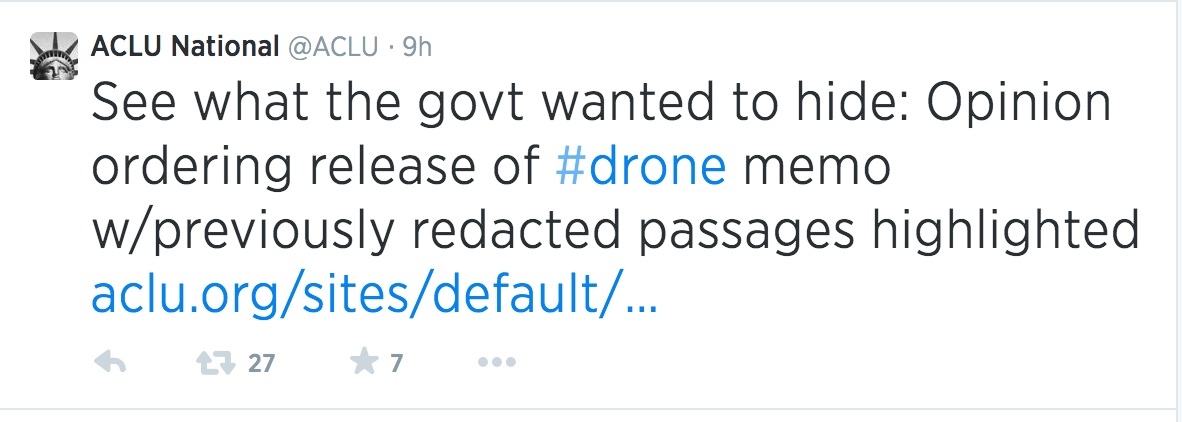“In societies that profess some respect for law, suspects are apprehended and brought to fair trial. I stress ‘suspects.”
~ Noam Chomsky
Yesterday the US Government released a redacted memo explaining the if, when, where and why the government can engage in the killing of US citizens without due process (or even a trial).
The “Drone Memo” came about as a legal justification for the killing of US citizens abroad using drones. However, the dense and impenetrable memo reads like something written for kid geniuses, the highly educated, or maybe no one. The inaccessibility of the document left even organizations such as the American Civil Liberties Union (ACLU) asking more questions than offering explanations.
Mind numbing language fills the document:
Ex-tra-legal (Does that mean even more legal?)
Theory of “imm-i-nence”
Targeted Killings (Say wwwhhhhattt?)
All of this leaves me feeling more confused and honestly a little freaked out.
At its core, the memo—released after the New York Times and the ACLU jointly filed for its release under the Freedom of Information Act—asks an essential question: During times of war are United States citizens afforded their basic rights?
Rights such as due process before being killed by their government? Beyond due process this document leaves us asking, do we have the right to a trial at all?
The infamous Supreme Court Justice Oliver Wendell Holmes said, “there can be no doubt that due process embraces the fundamental conception of a fair trial, with the opportunity to be heard.”
This idea that we live in a fair and free society maintains a kind of peace, the kind of peace that urges us to engage our democracy instead of rebel against it. When the government can—in secret and without approval—abridge this basic right it calls into question the stability of our democracy.
The notion that citizens have a right to a fair trial—or just a trial before death by drone—is a fundamental component of American democracy. The evolution of warfare since September 11th has challenged this idea perhaps more than any other time. The US has never fought a stateless war, and now we are suddenly asking questions like, who is an enemy combatant? Who is the enemy?
It is a war that is not governed by geography, not guided by history, and a war without precedent. The ambiguity of it all leaves room for the abuse of power in subversive and quiet but highly consequential ways.
James Madison said, “I believe there are more instances of the abridgment of the freedom of the people by gradual and silent encroachments of those in power than by violent and sudden usurpations.” The “Drone Memo” is, if not silent, at the very least a quiet and gradual encroachment on some of the most important tenets of American democracy.
Whether or not you understand things like due process, habeas corpus, or if enemy combatants are still protected by the United States Constitution, you should—at the very least— know if an unmanned drone can fly into your neighborhood and set the house next door aflame.
And if you are an active and engaged citizen the erosion of our democratic processes should at the very least deeply concern you if not motivate you to take action.
Hopefully in the coming days, the dense document will be translated into language that will answer these questions. But if that doesn’t happen, what will we do? What then? What’s next?
Reactions to the “Drone Memo”:
Love elephant and want to go steady?
Sign up for our (curated) daily and weekly newsletters!
Editor: Catherine Monkman
Photos: Imgur
 Share on bsky
Share on bsky





Read 3 comments and reply